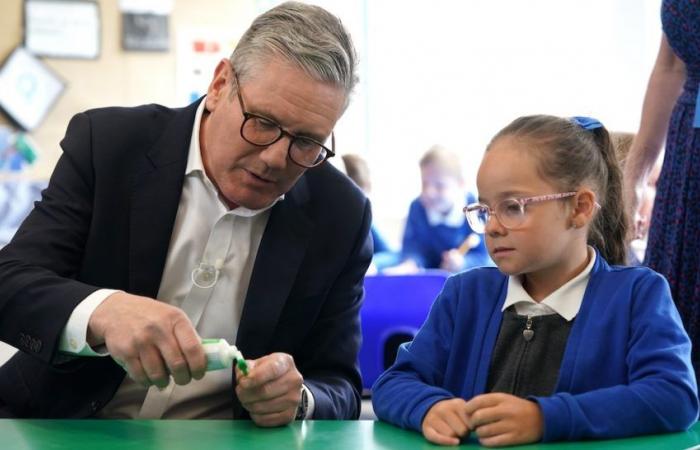Loading player
The British National Health Service (NHS) is one of the central themes of the election campaign for the 4 July elections. The NHS has long been a source of pride for the citizens of the United Kingdom, but it has been in crisis since the years of the Covid-19 pandemic and, also due to staff strikes, its waiting lists have grown very elongated, to include 6.3 million citizens in England alone (one of the nations that make up the United Kingdom together with Wales, Scotland and Northern Ireland). Both the Conservatives, who have been in government for 14 years, and Labour, who are about to return, have promised to intervene.
Within this general crisis of public health there is a second, particularly acute, crisis concerning dental care and treatment, or dentists in short. The possibility of having an NHS-contracted dentist, according to a survey, is one of the four priorities of voters at local level: almost a third (28 percent) of respondents indicated it, more than those who cited crime or public transport. The top three priorities instead are the state of the roads (42 percent), the availability of GPs (40 percent) and affordable housing (36 percent).
Thus it happens that candidates, aspiring parliamentarians and ministers, find themselves having to talk about their opinions in interviews more often than in any other European country. dentistry policies, which would be the “dental policies” of their party’s program, clashing over the feasibility of the proposals. Or that the Labor leader, Keir Starmer, is photographed in a school surrounded by pupils holding toothbrushes and toothpaste.
British politicians have long been trying, in vain, to resolve the “dentist crisis”, as the media has called it. In 1999, Labor Prime Minister Tony Blair promised that everyone would have easy access to registered dentists within the next two years. In 2005, two years before the end of his term, Blair had to admit that he had not succeeded and called dentistry “the most difficult aspect of the NHS”.
The current Labour leader Starmer, whose election victory is now almost a given, has made a similar promise to Blair. During the election campaign Starmer has insisted on the excellence of the NHS and https://twitter.com/PolitlcsUK/status/1805296646353219988 that his mother and sister were nurses and that his wife, Victoria Alexander, is in charge of workplace safety for a large public hospital in the capital, London.
If, as it seems, Starmer becomes prime minister, he will find himself in a very difficult situation. In January an inquiry by the Guardian has defined some areas of the country as “dental deserts”, especially rural and coastal areas, where there are no contracted dentists, or where contracted dentists do not take new patients. The result is that 40 percent of minors do not have access to the regular check-ups that they would need most during their growing years.
Not being able to go to a dentist, between 2022 and 2023 more than 30 thousand minors – and in England 70 thousand adults – went to hospital emergency rooms, which were already overloaded. In England, tooth decay is the leading cause of hospitalization for those aged between 5 and 17.
One of the problems of going to a hospital is that emergency room doctors are almost never trained specifically in dental conditions and end up prescribing painkillers or antibiotics if there is an infection. A doctor who works in a London hospital told Guardian that in some cases she and her colleagues have had to treat people who had overdone their painkillers, taken without consulting a doctor.
(Leon Neal/Getty Images)
This situation also depends on the fact that 90 percent of dentists affiliated with the NHS no longer accept new patients: both because there are few of them, and because accepting patients under an affiliated regime is not economically convenient. Many dental practices only take in the children of people they already have under their care, usually privately. In the coming years, among other things, 75 percent of dentists in the United Kingdom intend to reduce the number of subsidized visits according to a survey published by the British Dental Association (BDA), their trade association.
In the UK, dental care is not fully covered by the NHS. In 1951, Aneurin Bevan, considered the founder of the NHS, resigned as Health Secretary over the introduction of a charge for dental care, which he believed should be free.
British dentists work as freelancers, but around two-thirds of them are contracted to the NHS to provide a range of services. In 2022, there were around 33,000 British dentists in a population of 67.6 million people; in Italy there are more than 49 thousand dentists, out of a smaller population.
The national contract regulating this provision has not been updated since 2006 and has repeatedly been found wanting by the Health Committee of the House of Commons, the lower house of the British parliament. One of the main limitations, according to dentists, is that it forces them to provide a certain number of services per year which, however, are identified only by type, without taking into account how long they last and how many treatments are administered during a single session. In essence, the contract is considered penalizing from an economic point of view.
British Prime Minister Rishi Sunak visits a dentist’s office in Newquay, on February 8. (Hugh Hastings/Getty Images)
NHS services have a cost, borne by the patient, which is set by law in three brackets. They range from a minimum ticket of 26.80 pounds (31.7 euros), for routine checks, to one of 73.5 pounds (86.9 euros) for other checks, up to 319.80 pounds (377, 9 euros) for the most demanding interventions. Minors, pregnant women and people in poverty are exempt.
These tickets represent 25 percent of the total cost of the service. The remaining 75 per cent is covered by the NHS, which then distributes reimbursements to dentists based on how many visits they have made each year. The total funds, however, are calculated on the basis of the 2006 needs: taking inflation into account, the funds for England have fallen from 3.56 billion pounds (4.2 billion euros) in the 2010-2011 period to £2.9 billion (€3.4 billion) between 2022 and 2023.
It is not convenient for dentists to accept many appointments through the NHS because they take time away from private ones, which are more profitable: for the same service, the cost in the private regime can be three times that in the public regime.
In an attempt to incentivize dentists, the Conservative government raised the fee charged to patients by 25 percent in March. But that didn’t solve the problem: it’s still too little for dentists, and so they continue not to accept new patients, while those who had trouble paying the reduced fees certainly won’t be able to do so now that they’ve gone up.
According to Ian Mills, Professor of Dental Care at the University of Plymouth who wrote about it on the website The Conversation, failure to update the contract is the main cause of the crisis together with insufficient investments. All this in a country that has the lowest per capita spending on oral hygiene among the G7 countries.
– Read also: British Labour remains vague
Both Labor and the Conservatives intend to amend the contract. Labour’s program promises 700,000 more urgent dental appointments; economic incentives for dentists who work in uncovered areas, or who decide to do so; a supervision program in schools to promote oral hygiene among children aged 3 to 5 years. However, it may take years before these measures – which are very expensive and Labor plans to finance them by reducing tax evasion – take effect.
One of the stereotypes about the English, before the British, is that they have “crooked teeth”. In an old episode of SimpsonRalph was shown “The Great Book of British Smiles” to scare him about what would happen to him if he didn’t brush his teeth. Years ago BBC News he spoke of it as a false myth: a “cultural stereotype” that “could have had some element of truth in the past”. The article by BBC News it was 2015: before the “dentist crisis”, before years of unheeded reports and before a problem now considered solved became so current again.
– Listen to Globo: These unusual British elections, with Barbara Serra






